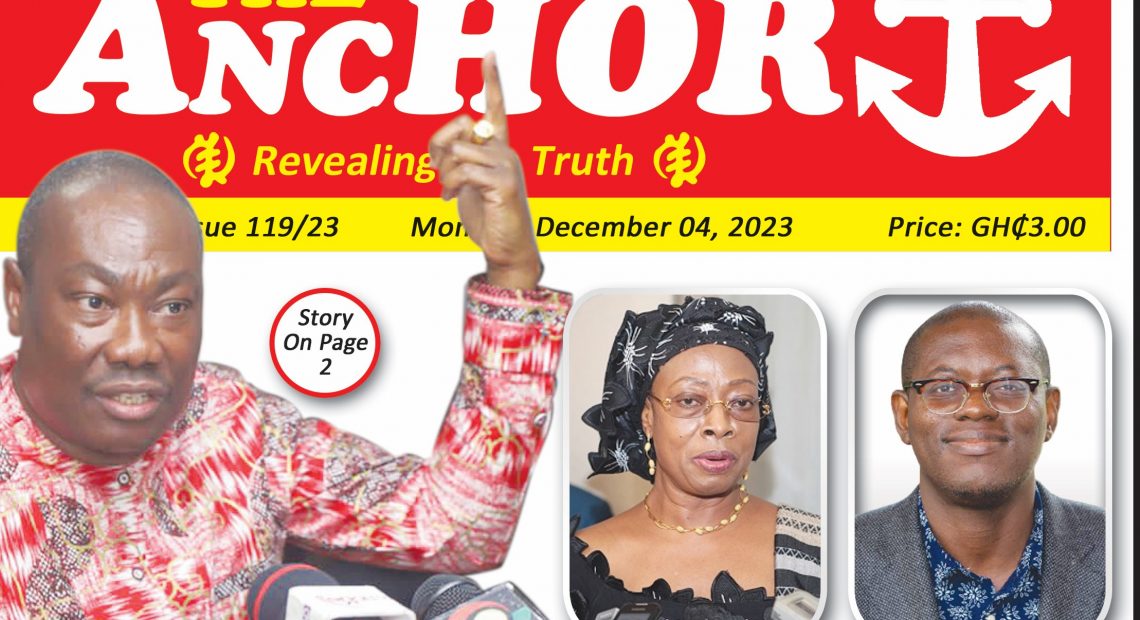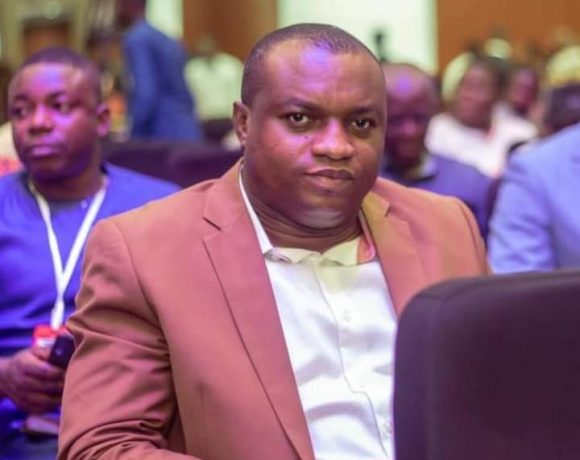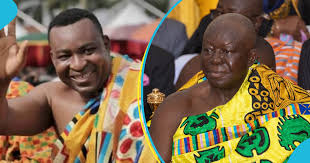No Country Can Secure 40% Royalty In Mining Contracts

…Minerals Commission Boss Replies Ex-CJ, CSOs, Others Over Lithium Deal
By Gifty Arthur
The Chief Executive Officer (CEO) of the Minerals Commission has rubbished claim that Ghana’s $250-million lithium agreement, with Barari DV Ghana Limited, a subsidiary of an Australian company, Atlantic Lithium Limited, is a bad deal.
According to Martin Kwaku Ayisi, no country in Africa, or the world, can charge up to 40 percent in royalty, as some civil society organizations (CSOs) and individuals would have wished.
He argued that, countries like Zimbabwe and others that have larger lithium reserves than Ghana are not charging royalties more than 6 percent, because investors will not be able to patronize it.
“Do you want us to go and charge 40, 20 or 30 percent royalty? Nobody will come to your country. There is a project in Mali, it is nearly three times the size of Ewoyaa. Mali is not charging more than 6 percent; they have better reserves than us.
“Zimbabwe has largest reserves of Lithium in Africa and number 6 in the world, they are not charging royalty more than 6 percent. So, if you sit in Ghana and you say you want to charge royalty more than 6 percent, nobody will come to Ghana. You must as well forget it. Now even locals will not do that, I will put my money in real estate,” he said in an interview monitored by The Anchor.
The CEO also disagreed with suggestion for Ghana to set up its own lithium company to mine the mineral, stressing that history has shown that Ghana cannot manage such a venture.
Messed up chances
Speaking on Metro Television’s Good Morning Ghana segment called ‘Time With Minerals Commission,’ Mr.Ayisi said, “People should know that we have a history, we have had opportunity to do it ourselves, we messed up.”
“To answer Sophia Akuffo, all those people, we used to have a state gold mining cooperation. The head office of Minerals Commission was the former head office of the state mining cooperation. So, we have been there before.
“We had the opportunity as a country to do it ourselves, geological survey and GMC, Tarkwa, Prestea, Dunkwa Continental, Ghana Bauxite Manganese, they were all dominated and run by the state, we ran them down like the Ghana Airways, like all GIHOC Pharmaceutical Company. So, I don’t support state-run mine,” he argued.
CJ’s Argument
As a Distinguished Scholar of the Institute of Economic Affairs (IEA), a former Chief Justice (CJ), Sophia Akuffo, expressed disquiet about the deal, describing it as a colonial agreement which must be decommissioned.
In the view of the former CJ, the agreement is not different in principle from previous mineral resource agreements Ghana has signed up for.
“It is not different in principle in the substance from any of Ghana’s previous colonial times types of agreements, some call it the Guggisberg model, whatever description, all those agreements are colonial type of agreements, which over the years have yielded very little good to the overall benefit of the average Ghanaian,” she said.
Madam Akuffo argued that government have sole ownership of mining resources to ensure that citizens benefit from it.
“The Republic of Ghana should establish a Ghana Lithium Company. The Ghana Lithium Company should be commissioned to develop the entire value chain, from mining raw lithium to the manufacture of batteries and other products in Ghana,” she suggested.
She added, “Current international best practices and a local refinery must be established before extraction commences so that there will be no excuses, such as ‘we haven’t finished building the refinery, therefore, we are, as usual, exporting raw product’.”
Resource Geological Survey
But speaking directly to the issue, Mr.Ayisi said the agreement was not signed in isolation from others signed around the world.
In place of Ghana mining its own lithium, the CEO objected to that and rather suggested that government resources the Geological Survey well with all it needs to do its work.
He said Ghana can also ensure that every year it employs “quality staff, resources the institution, provide good condition of service, give tools to work, decide on what minerals are strategic for Ghana, and identify certain minerals that are critical looking at, among others.”
According to him, Ghana is unable to have much say in its mineral resources’ agreements presently because the necessary funding for the institution, whose job it is to explore and collect data, is simply unavailable.
In his estimation, Ghana can take a bold decision and resource the institution to the tune of $5 to 10 million to undertake this exercise every year.
He said investors cannot come and invest in a mineral resource of a country, spend about $50 million, after considering the geological risk, reward and endowment; political and microeconomics risks; fiscal regime and then pay about 40 percent royalty and still allocate which percentage to the country which did not invest anything.
“There are basically two ways: It’s either you look at what is happening around you and you design your field work so that you will be able to compete or you do it yourself.
“So the likes of former Chief Justice Sophia Akuffo, Institute of Economic Affairs and think-tanks are saying that ‘we are signing colonial agreements, we are raising to the button, we are giving everything away,’ then my answer to them is very simple, resource the Geological Survey, buy them all the vehicles, give them all the money, to deploy all the technology, Ghana is opened, let them go out there, do the exploration, generate the data, package it, zone Ghana into lithium and any critical mineral or gold, invite the locals and foreign, create blocs….. That is what I have been calling for,” Mr. Ayisi submitted.
No Cause for Alarm
Aside from seeing the deal as not in the best interest of Ghanaians, the IEA also expressed concern that the agreement is yet to go to Parliament.
But the Mineral Commission boss asserted that no harm has been caused, though the first phase of the agreement has been reached, adding that the agreement is being sent to cabinet and from there, it will be sent to the august House for the necessary procedure.
“Atlantic Lithium, through Barari, are not conducting any mining operation yet because if you look at the statement or the comments by the former Chief Justice, the lordship Sophia Akuffo, she said the agreement has to go to Parliament. I think Randy you have asked that question and I told you that we still have some regulatory steps that need to be completed, so yes, the company has been issued with a mining lease, properly signed by the minister which the law mandate him to do acting on the recommendation of the Minerals Commission that has been done,” he explained.
He added, “So even if Parliament should ratify the mining lease today, assuming Parliament should ratify the mining lease today, they still cannot conduct any mining operations unless they get an EPA permit, they come back to Minerals Commission, we give them operating permit, we even have to give them constructing permit, then they can go now to put in place the necessary infrastructure to start perhaps the construction process of the mine. Once the minister signs, they have to take it to Parliament. So, the minister has signed, he needs to get to Cabinet and then take to Parliament that will be done because the impression is that once the minister has signed people are mining, No. what is happening is that they are still exploring.”
Background
At the signing ceremony led by Minister of Lands and Natural Resources, on Thursday October 19, this year, Samuel Abu Jinapor said government took lessons from previous mineral contracts.
As part of the agreement, government ensured there was increase in royalty rate from the standard 5% to 10% and the state’s interest in the project from 10% to 13%.
Government through the Minerals Commission Income Fund will acquire additional 6% in the mining operation, as well as a 3.06% in the company’s parent entity, which is listed on the Australian and London Stocks Exchange.
“The lease we are signing today differs from our standard Mining Lease, in that, it incorporates the agreed terms we have concluded with the company, based on the policy approved by Cabinet,” Mr. Jinapor said.
He said the agreed terms give government and the citizens, greater value in the mineral, which has been found in Ewoyaa, a community in the Mfantseman Municipality in the Central Region
Source: Anchorghana.com




